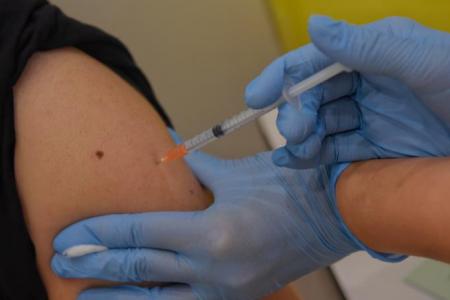People aged 60 to 79 can take second booster if they want
People aged 60 to 79 can now take a second Covid-19 booster shot if they wish to, even as the Expert Committee on Covid-19 has yet to recommendthat they do so.
The second booster vaccine dose should be administered about five months after a person receives the first booster, said Health Minister Ong Ye Kung at a press conference held by the multi-ministry task force on Covid-19 on Friday (April 22).
Those aged 60 and above who would like to receive their second booster can walk in before 7pm to any vaccination centre offering mRNA vaccines.
These boosters are currently recommended for those aged 80 and above, residents of aged care and medically vulnerable people.
Some 17,200 seniors have taken their second booster within two weeks of the committee's recommendation, representing about 30 per cent of those eligible, with many more in this age group to become eligible in the months ahead, said Mr Ong.
He added that there are two key considerationswhen deciding whether to proactively roll out a second booster.
"One, whether subsequent Omicron or new variant waves break out in other countries. When they do, we will then have a good idea when a new wave may emerge in Singapore, and then we roll out a second booster before that happens," he said.
The second indicator is the level of vaccine protection against severe illness in the population who have already had their first booster.
Mr Ong said: "So far, this has been holding up well as vaccine efficacy against severe illness across different age groups continues to stay very high, well above 80 per cent.
"Scientists think that this can hold out for as long as one to two years, maybe even longer. We will watch out for early signs of waning of vaccine efficacy against severe illness, which will indicate the need for a second booster."
In considering which vaccines to use for a second booster for the general population, he said this depends on the nature of the new variant of concern - for instance, if it is a derivative of the Omicron variant with similar characteristics and there is a high chance that current vaccines will continue to confer good protection against the virus.
"However, if the new variant of concern is more dangerous than the Omicron variant, then it may require a different response strategy as far as the second booster is concerned," he said.
Two characteristics can be used to determine if a variant is more dangerous - whether it leads to more severe illnesses and deaths among infected individuals, and if it is more infectious than Omicron and dominate it.
"If it is both... we may then need to hunker down for six months or more while scientists develop a new variant-specific vaccine. This is one of the worst-case scenarios that we need to be psychologically prepared for," he added.
Get The New Paper on your phone with the free TNP app. Download from the Apple App Store or Google Play Store now


